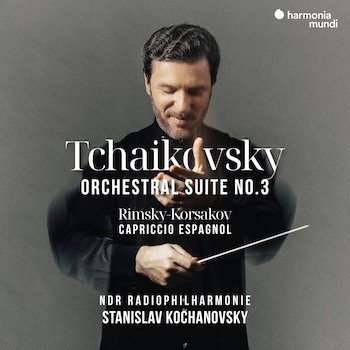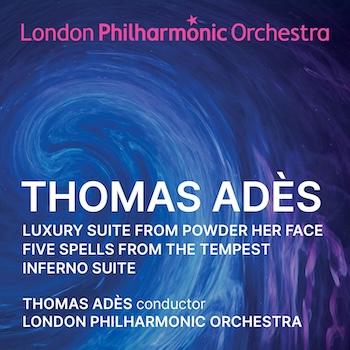Classical Music Review: Rimsky-Korsakov & Tchaikovsky Orchestral Works and Adès conducts Adès
By Jonathan Blumhofer
NDR Radiophilharmonie and Stanislav Kochanovsky may generate new fans for Tchaikovsky’s four orchestral suites; if you only want to dip your toes in Thomas Adès’ extraordinary music, his own take makes for a worthy introduction.
 That Tchaikovsky’s four orchestral suites have languished—at least in comparison with his symphonies, ballets, and several concertos—is a bit surprising: they’re substantial, tune-filled scores, after all, and all of them date from his maturity. While a new recording of the G-major Suite No. 3 from the NDR Radiophilharmonie and Stanislav Kochanovsky might not alter its larger reception history, the piece gets a performance that, one hopes, will gain it some new fans and maybe make converts for the larger set.
That Tchaikovsky’s four orchestral suites have languished—at least in comparison with his symphonies, ballets, and several concertos—is a bit surprising: they’re substantial, tune-filled scores, after all, and all of them date from his maturity. While a new recording of the G-major Suite No. 3 from the NDR Radiophilharmonie and Stanislav Kochanovsky might not alter its larger reception history, the piece gets a performance that, one hopes, will gain it some new fans and maybe make converts for the larger set.
On the whole, the Hannover-based ensemble’s reading is excellent: nuanced and attuned to the little things. Far from sounding pedantic, their account ably captures the fresh invention of Tchaikovsky’s writing, especially the plays of duple-against-triple rhythms in the first and third movements. The latter, crisp and precise, further benefits from some featherweight woodwind contributions.
In the “Valse mélancolique,” the originality of the orchestration—notably the octave figures passed between strings and winds in the middle—results in a performance that pulses and breathes with commendable immediacy. The finale, too, with its dozen-or-so variations and bombastic coda, is well-paced and exciting.
Prefacing the Suite is a more familiar showpiece in the form of Nikolai Rimsky-Korsakov’s Capriccio espagnol. Here, Kochanovsky draws playing from his forces of bright energy. Individual solos are characterful and shapely, especially during the “Scena e canto gitano’s” parade of violin, clarinet, flute, and harp solos. Though one might imagine a more frenzied coda to the “Fandango asturiano,” there’s no want of spirit or style in this one.
Filling out the program is the prelude to Nikolai Tcherepnin’s incidental music for the play, “La Princesse lointaine.” It proves a charming discovery: floating and lyrical over its first part and stormy in the second, with a serene coda to wrap things up. Kochanovsky and his band lavish as much care on this obscurity as they do the disc’s larger works.
 The vogue for virtuosic, Lisztian concert paraphrases of theater music peaked in the 19th century. But the imperative to repurpose music originally written for the stage remains alive and well: John Adams, among others, has given us a Doctor Atomic Symphony on themes from that 2005 opera. Thomas Adès is one of those others and, not to be outdone, also produced a similar installment in the genre based on his surrealist opera The Exterminating Angel.
The vogue for virtuosic, Lisztian concert paraphrases of theater music peaked in the 19th century. But the imperative to repurpose music originally written for the stage remains alive and well: John Adams, among others, has given us a Doctor Atomic Symphony on themes from that 2005 opera. Thomas Adès is one of those others and, not to be outdone, also produced a similar installment in the genre based on his surrealist opera The Exterminating Angel.
But the orchestral concert suite remains Adès’s vehicle of choice, as both his catalogue of works and discography remind. A new release from the London Philharmonic Orchestra conducted by the composer makes clear why that’s the case.
To wit, the genre is eminently flexible and effective. Take the “Luxury Suite” from Powder Her Face. The third and most substantial adaptation of music from Adès’ 1995 opera (it was preceded by the “Three-Piece Suite” and “Hotel Suite”), the effort distills roughly a quarter of the original’s content into a still-concise, thirty-minute argument. “Five Spells” from The Tempest accomplishes a slightly smaller feat with music from the composer’s 2004 Shakespeare adaptation, while the “Inferno Suite” from Dante whittles that ballet’s first act down to its essential two-thirds.
The omission of so much music from the latter is regrettable, if only because Dante is such a spectacular score. But some of its finest moments—“Pavan of the Souls in Limbo,” “The Hypocrites,” and “The Thieves”—are included in the “Suite.”
Likewise, some of the most captivating music from The Tempest made it into the “Five Spells,” in particular the storm-tossed Overture and the dreamlike music accompanying Ariel’s Act 3 feast. Here, too, the treacherous writing for the soprano singing that character finds itself transferred, quite naturally it turns out, to the woodwind section.
There’s no need to argue with any of the performances here, especially with Adès on the podium: he knows his stuff and is an excellent champion of his work. The “Luxury Suite,” by turns saucy and touching, sings explosively. At times (notably during the waltz and parts of the “Paperchase”), a sort of deconstructed Mahlerian shadow intrudes. The “Hotel Manager’s Aria” is a picture of pathos. Throughout, the LPO’s playing is breathtakingly on-point.
That spirit carries into the “Five Spells”—the liquid phrases in “Ferdinand and Miranda” are passed off beautifully and “Prospero’s Farewell” is bathed in mystery—as well as the “Inferno Suite.” Gustavo Dudamel’s complete account of the ballet with the Los Angeles Philharmonic remains the preferred version, though, if you only want to dip your toes in this extraordinary music, Adès’ own take makes for a worthy introduction.
Jonathan Blumhofer is a composer and violist who has been active in the greater Boston area since 2004. His music has received numerous awards and been performed by various ensembles, including the American Composers Orchestra, Kiev Philharmonic, Camerata Chicago, Xanthos Ensemble, and Juventas New Music Group. Since receiving his doctorate from Boston University in 2010, Jon has taught at Clark University, Worcester Polytechnic Institute, and online for the University of Phoenix, in addition to writing music criticism for the Worcester Telegram & Gazette.
Tagged: Harmonia Mundi, LSO, London-Symphony-Orchestra, NDR Radiophilharmonie, Stanislav Kochanovsky
